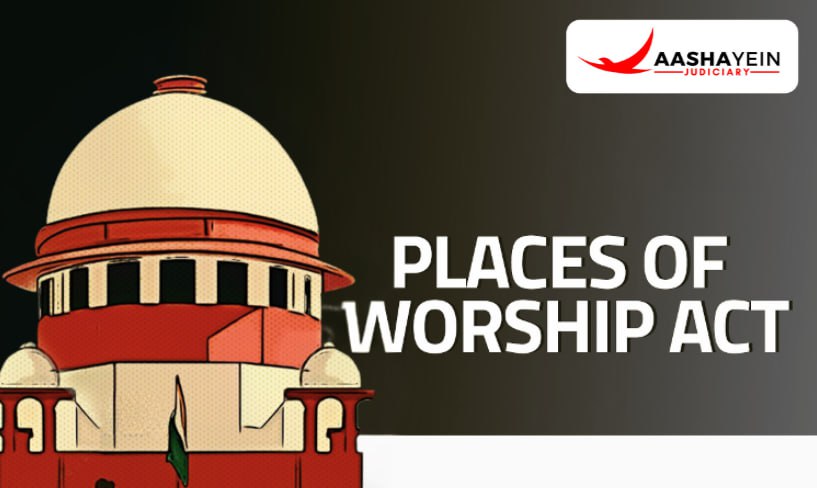The Places of Worship (Special Provisions) Act, 1991, was a landmark legislation passed by the Indian Parliament to maintain the religious character of places of worship as it stood on August 15, 1947. With one notable exception,the Ram Janmabhoomi-Babri Masjid dispute—the law prevents the conversion of any place of worship, including mosques, temples, and churches, thereby preserving their historical and religious identity.
However, the Act has now come under legal scrutiny, particularly with a batch of petitions challenging its validity pending before the Supreme Court. These petitions have drawn attention to significant constitutional concerns, raising questions about the Act’s impact on the rights of religious communities, secularism, and judicial review.
The Shahi Masjid Committee’s Plea
One of the most recent developments in the case involves the Shahi Masjid Committee of Mathura. The committee has filed an application before the Supreme Court urging the Court to close the Union Government’s right to counter the ongoing petitions challenging the Places of Worship Act. The committee claims that despite multiple opportunities over the last four years, the Centre has deliberately failed to file a response to the challenge. This, according to the committee, has led to unnecessary delays in the case, and the Centre’s non-compliance is obstructing the hearing process.
The mosque committee’s application stresses that the Centre’s viewpoint is crucial to resolving the matter, as it would significantly influence the positions taken by opposing parties in the case. The committee has now requested that the Court take the unusual step of closing the Centre’s right to file a reply in the case, given the prolonged delay.
You can also read the latest judgment by visiting [Latest Judgment].
For more information, visit [Aashayein Enquiry Section].
Legal Issues Raised by the Act
The Places of Worship Act has sparked a heated debate, especially following the filing of petitions in 2020 that argue the law infringes upon the rights of Hindus to practice their faith. The petitioners contend that the Act disproportionately benefits one community over others and violates the secular fabric of India’s Constitution. One of the key issues with the law is that it bars courts from adjudicating on matters related to the conversion of religious places, effectively preventing judicial review of claims surrounding religious sites. This, the petitioners argue, is a direct violation of their right to seek legal remedies in courts.
The Controversy in Mathura
At the heart of the ongoing legal battle lies the Shahi Eidgah Mosque in Mathura, a site that Hindu worshippers claim was built over the birthplace of Lord Krishna, known as Krishna Janm Sthan. These worshippers have filed multiple suits in the Allahabad High Court, demanding that a survey be conducted to ascertain the true religious character of the site. The mosque’s management committee has opposed these suits and emphasized the legal importance of resolving the issue surrounding the Places of Worship Act before any further legal actions are taken at the local level.
In this context, the Supreme Court has intervened, directing a stay on the proceedings in civil courts where similar petitions are pending. The Court also directed that no new suits be filed and that no interim or final orders be passed in the existing suits. This stay was prompted by the violent clashes that erupted in Uttar Pradesh following a survey of the Jama Masjid mosque in Sambhal, which had been conducted in compliance with a trial court's order. The violence further underscored the sensitive nature of disputes over religious places of worship.
The Delayed Response from the Centre
The Centre’s delay in filing a response has been a major point of contention. The mosque committee has argued that this delay is part of a broader strategy to prolong the legal proceedings, which could ultimately result in obstructing the parties challenging the Act from making their submissions. Despite multiple directives from the Supreme Court, including a specific deadline of 31 October 2022, the Centre has yet to file a response, further complicating the legal landscape.
On 12 December 2024, the newly constituted bench, led by Chief Justice of India Sanjiv Khanna, gave the Centre another four-week deadline to file its response, but the deadline has passed without any submission. The Supreme Court has set 17 February 2025 as the next date for hearing the case, and it is expected to take up the application requesting that the Centre’s right to file a reply be closed.
Conclusion
The Places of Worship Act has become a flashpoint in the ongoing debate over religious identity, secularism, and the role of courts in resolving sensitive religious disputes. The Supreme Court's decision on the legal validity of the Act will have far-reaching implications not only for religious communities but also for the future of judicial review and secular governance in India.
The delay in the Centre’s response is a troubling development that undermines the principle of timely justice. As the case progresses, it will be critical for the Court to carefully balance the interests of all parties involved while ensuring that the law is applied in a manner that respects the Constitution and protects the rights of all citizens, regardless of their religion.

